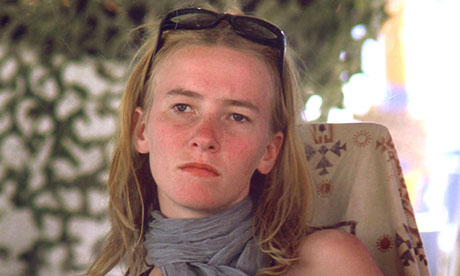
Corrie's death was an accident for which the state of Israel was not responsible, said the judge at Haifa district court.
There had been no fault in the internal Israeli military investigation clearing the driver of the bulldozer that crushed Corrie to death in March 2003 of any blame. The judge said the driver had not seen the young American activist.
Corrie could have saved herself by moving out of the zone of danger as any reasonable person would have done, said Judge Oded Gershon. He ruled that no compensation would be paid and the family would not have to pay costs of the case.
After the ruling was read out by the judge, the family's lawyer, Hussein Abu Hussein, said: "We knew from the beginning that we had an uphill battle to get truthful answers and justice. But we are concerned that this verdict denies the strong evidence and contradicts the principles of international law."
Also speaking after the ruling, the state's attorney said the Israeli soldiers at the scene of Corrie's death did "everything they could" to prevent harm being caused to any person.
The lawsuit, filed by Corrie's parents, Cindy and Craig, of Olympia, Washington state, accused the Israeli military of either unlawfully or intentionally killing Rachel or of gross negligence.
Their daughter was killed on 16 March 2003, crushed under an Israeli military bulldozer while trying to obstruct the demolition of a Palestinian home in Rafah on to the Gaza-Egypt border.
At the time – the height of the second intifada, or Palestinian uprising – house demolitions were common, part of an increasing cycle of violence from both sides. Palestinian suicide bombers were causing death and destruction with terrifying frequency; the Israeli military was using its mighty force and weaponry to crush the uprising.
The Israeli Defence Forces said the houses it targeted with bulldozers and shells were harbouring militants or weapons or being used to conceal arms-smuggling tunnels under the border. Human rights groups said the demolitions were collective punishment. From 2000-04 the Israeli military demolished around 1,700 homes in Rafah, leaving about 17,000 people homeless, according to the Israeli human rights organisation B'Tselem.
Corrie was one of a group of around eight international activists acting as human shields against the demolitions. According to witness statements made at the time and evidence given in court, she clambered on top of a mound of earth in the path of an advancing Caterpillar bulldozer.
"She was standing on top of a pile of earth," fellow activist and eyewitness Richard Purssell, from Brighton, said at the time. "The driver cannot have failed to see her. As the blade pushed the pile, the earth rose up. Rachel slid down the pile. It looks as if her foot got caught. The driver didn't slow down; he just ran over her. Then he reversed the bulldozer back over her again."
Tom Dale, an 18-year-old from Lichfield in Staffordshire, said: "The bulldozer went towards her very slowly, she was fully in clear view, straight in front of them. Unfortunately she couldn't keep her grip there and she started to slip down. You could see she was in serious trouble, there was panic in her face as she was turning around. All the activists there were screaming, running towards the bulldozer, trying to get them to stop. But they just kept on going."
The day after Corrie's death, Israel's then prime minister, Ariel Sharon, promised US president George W Bush that Israel would conduct a "thorough, credible and transparent" investigation into the incident.
Within a month the IDF had completed an internal inquiry led by its chief of staff. It concluded that its forces were not to blame, that the driver of the bulldozer had not seen the activist, that no charges would be brought and the case was closed.
"Rachel Corrie was not run over by an engineering vehicle but rather was struck by a hard object, most probably a slab of concrete which was moved or slid down while the mound of earth which she was standing behind was moved," it said. Corrie and other ISM activists were accused by the investigators of "illegal, irresponsible and dangerous" behaviour.
The Corries launched their civil lawsuit against the state of Israel as an "absolutely last resort". The case opened at Haifa district court in March 2010.
Among those giving evidence was the driver of the bulldozer, who testified anonymously from behind a screen for "security reasons". He repeatedly insisted that the first time he saw the activist was when she was already dying: "I didn't see her before the incident. I saw people pulling the body out from under the earth."
The hearings ended in July last year.



Δεν υπάρχουν σχόλια:
Δημοσίευση σχολίου